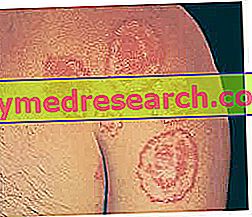Definition
Paget's disease (also known as Paget's bone disease or as a deforming osteitis) is a metabolic pathology of the bone, in which there is an alteration in the processes of bone remodeling. This alteration is characterized by an imbalance between the destruction and deposition of new mineralized bone matrix, which is replaced by a weaker structure. This phenomenon consequently leads to deformation, fragility and bone fractures.
Paget's disease mainly affects elderly patients and can affect any bone in the body.
Causes
The cause of Paget's disease has not yet been identified.
It is hypothesized that some genetic alterations concerning certain types of genes are involved in the onset of the disease, which encode proteins involved in the activity of osteoclasts (responsible for the reabsorption of the bone matrix).
Another rather accepted hypothesis is that Paget's disease is caused by a viral infection sustained by a slow-replicating virus. It is thought that this virus "establishes" itself in bone cells several years before the first symptoms appear and that it can then begin to attack the osteoclasts, thus starting an inflammatory process that will then lead to the development of the disease. The virus in question appears to be a paramyxovirus, but there is still no definite evidence to confirm this theory.
Symptoms
In many cases, Paget's disease is asymptomatic, or presents with mild symptoms that can be confused with other bone diseases and that, therefore, make it difficult to identify.
However, the most common symptom of Paget's disease is bone pain located in the area affected by the disease. In addition to this, joint stiffness, numbness, tingling sensation, weakness, fractures, deformity and bone fragility may also occur.
If the bones affected by the disease are those of the skull, then headaches, tinnitus and hearing loss may also arise.
Furthermore, Paget's disease can cause cardiac, neurological, rheumatologic and metabolic complications, giving rise to disorders such as - for example - heart failure, ventricular hypertrophy, hypercalcaemia, kidney stones, paraesthesia, vertebral stenosis, asthenia, vertigo and primary hyperparathyroidism.
Information on Paget's Diseases - Drugs for Treating Paget's Disease is not intended to replace the direct relationship between health professional and patient. Always consult your doctor and / or specialist before taking Paget's disease - Medications to treat Paget's disease.
drugs
In the treatment of Paget's disease, early diagnosis is essential. In fact, drug therapy is all the more effective as soon as it is administered. In particular, when it is carried out before the onset of any complications.
The first-line drugs used in the treatment of Paget's disease are bisphosphonates.
In patients who do not tolerate the aforementioned treatment with bisphosphonates, on the other hand, a therapy based on calcitonin can be started, even if it is less effective.
Finally, for the control of bone pain caused by the disease, the doctor may decide to also prescribe the use of non-steroidal anti-inflammatory drugs.
In extreme cases, finally, the doctor may deem it necessary to resort to surgical treatment.

Bisphosphonates
As mentioned, bisphosphonates are the drugs of first choice for the treatment of Paget's disease. In fact, they are able to reduce bone turnover, reduce pain and promote the healing of osteoclastic lesions, thus also favoring the restoration of the normal bone matrix.
Among the various active ingredients that can be used, we recall:
- Neridronic acid (Nerixia ®): neridronic acid is available for parenteral administration. When used for the treatment of Paget's disease, the dose of medication usually used is 100 mg a day, to be administered through a slow intravenous infusion for two consecutive days. The total dose of medicine can also be divided into smaller doses to be administered intramuscularly for up to eight consecutive days.
This therapeutic cycle can possibly be repeated after an interval of at least six months.
- Alendronic acid (Alendros ®, Fosamax ®, Adronat ®, Dronal ®): alendronic acid is available for oral administration. The dose of drug usually administered is 10 mg a day, or 70 mg once a week.
The drug should be administered in the morning, at least thirty minutes before taking any food, drink or other medication.
- Clodronic acid (Clasteon ®, Clody ®, Difosfonal ®): clodronic acid is available both for oral administration and for parenteral administration (intramuscular and intravenous).
The amount of drug to be taken and the route of administration must be established by the doctor for each patient.
Calcitonin
Calcitonin is a hormone that is naturally produced by the thyroid and is involved in the regulation of calcium and bone metabolism.
Synthetic calcitonin (Calco ®, Calcitonin Sandoz ®, Biocalcin ®) can be used in patients who do not tolerate bisphosphonate treatment. However, it is less effective than the latter and its use is also associated with an increased risk of developing cancer.
Synthetic calcitonin is able to regulate calcium levels and reduce bone pain. Generally - when used for the treatment of Paget's disease - synthetic calcitonin is administered at a dose of 100 IU per day by an intramuscular or subcutaneous injection, for a period that can range from 2-4 weeks up to a maximum of 3 -6 months. The drug can be administered either in a single dose or in two divided doses.
In any case, the duration of the treatment will have to be established by the doctor on an individual basis.
NSAIDs
Non-steroidal anti-inflammatory drugs can be used to control bone pain caused by Paget's disease. Among the active ingredients most used, we recall:
- Ibuprofen (Brufen ®, Moment ®, Nurofen ®, Arfen ®, Actigrip fever and pain ®, Vicks fever and pain ®): when ibuprofen is administered orally, the dose used should not exceed 1, 200-1, 800 mg of drug per day. The exact amount of active ingredient to be taken must be established by the doctor for each patient.
- Naproxen (Momendol ®, Synflex ®, Xenar ®): if naproxen is administered orally, the usual daily dose is 500-1, 000 mg of drug, to be taken in divided doses every 12 hours.
- Acetylsalicylic acid (Aspirin ®, Alkaeffer ®): acetylsalicylic acid is available for oral and parenteral administration.
When administered orally, the dose of medication usually used in adults ranges from 325 mg to 1, 000 mg, to be taken 2-3 times a day.
When administered intravenously or intramuscularly, however, the dose of drug used in adults is 500-1, 000 mg, to be administered every 6, 8, or 12 hours.
However, the exact amount of drug to be taken and the route of administration must be established by the doctor.
Paracetamol
Paracetamol (Tachipirina ®, Efferalgan ®, Panadol ®) can also be used to treat bone pain caused by Paget's disease, thanks to its analgesic properties. It is a drug available in different pharmaceutical formulations. When used orally, the paracetamol doses usually used are 500-1000 mg, to be taken as needed for a maximum of 3-4 times a day.



